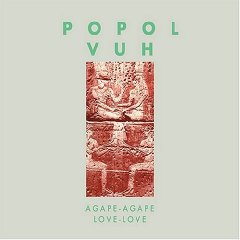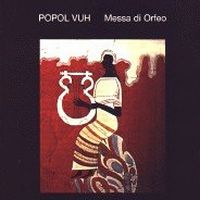Krautrock is a broad genre of experimental rock that developed in West Germany in the late 1960s and early 1970s. It originated among artists who blended elements of psychedelic rock, avant-garde composition, and electronic music, among other eclectic sources. Common elements included hypnotic rhythms, extended improvisation, musique concrète techniques, and early synthesizers, while the music generally moved away from the rhythm & blues roots and song structure found in traditional Anglo-American rock music. Prominent groups associated with the krautrock label included Neu!, Can, Faust, Tangerine Dream, Kraftwerk, Cluster, Ash Ra Tempel, Popol Vuh, Amon Düül II and Harmonia.

Zeit is the third studio album by German electronic music group Tangerine Dream. A double LP, it was released in August 1972, being the first release featuring Peter Baumann, who joined then-current members Christopher Franke and Edgar Froese. Zeit is subtitled Largo in Four Movements.
Popol Vuh were a German musical collective founded by keyboardist Florian Fricke in 1969 together with Frank Fiedler, Holger Trülzsch (percussion), and Bettina Fricke. Other important members during the next two decades included Djong Yun, Renate Knaup, Conny Veit, Daniel Fichelscher, Klaus Wiese, and Robert Eliscu. The band took its name from the Mayan manuscript containing the mythology of highland Guatemala's K'iche' people.
Daniel "Danny" Secundus Fichelscher,, is a German multi-instrumentalist who played a pivotal role in Krautrock band Popol Vuh, was a member of the German group Gila and is currently Amon Düül II's drummer. Fichelscher is the son of jazz pianist and singer Toby Fichelscher.

Florian Fricke (1944–2001) was a German musician who started his professional career with electronic music, using the Moog synthesizer, and was a founding member of the German rock group Popol Vuh.

Aguirre is the seventh album by German band Popol Vuh. It contains music used in the soundtrack to Werner Herzog's film Aguirre, the Wrath of God (1972), first released as an album in 1975 on Ohr, and reissued in 2004 by SPV with one bonus track. This score was the first of many filmic collaborations between the group and Herzog. Only two tracks are from the film; the rest were gathered from various recordings done by the group during the period 1972–74, including alternative versions of two songs originally released on the band's 1974 album, Einsjäger und Siebenjäger.

In den Gärten Pharaos is the second album by German band Popol Vuh, released in 1971 by record label Pilz.

Hosianna Mantra is the third album by German band Popol Vuh. It was originally released in 1972 on the German record label Pilz. The album saw the band blend elements of Western classical music, Asian music, and space rock. For the release, bandleader Florian Fricke abandoned electronic synthesizers and instead employed acoustic instruments such as piano, oboe, and tambura. Prominently featured are Korean vocalist Djong Yun and electric guitarist Conny Veit.

Seligpreisung is the fourth album by German band Popol Vuh. It was originally released in 1973 on record label Kosmische Musik. The title is the German name for the Beatitudes, from Christ's Sermon on the Mount.

Einsjäger und Siebenjäger is the fifth album by Popol Vuh. It was originally released in 1974 on Kosmische Musik. In 2004 SPV re-released the album with two bonus tracks. "Wo bist Du?" was originally released on Popol Vuh's album Die Nacht der Seele as "Wo bist Du, der Du überwunden hast?".

Letzte Tage – Letzte Nächte is the eighth album by Popol Vuh. It was originally released in 1976 on United Artists Records. In 2005 SPV re-released the album with three bonus tracks.

Herz aus Glas is the ninth album by Popol Vuh. It was originally released in 1977 on Brain Records. In 2005 SPV re-released the album with two bonus tracks. This album was released as the original motion picture soundtrack of Heart of Glass by German director Werner Herzog, but in fact only two tracks were actually featured in the film.

Nosferatu is the eleventh album by Popol Vuh and was released as the original motion picture soundtrack of Nosferatu: Phantom der Nacht by director Werner Herzog. It was originally released in 1978. In 2004 SPV re-released the album with a slightly different track list and adding four tracks originally released on the Popol Vuh album Brüder des Schattens – Söhne des Lichts.

Sei still, wisse ICH BIN is the thirteenth album by Popol Vuh. It was originally released in 1981 on Klaus Schulze's record label Innovative Communication. In 2006 SPV re-released the album with one bonus track. "Wehe Khorazin", "Garten der Gemeinschaft", an extract of "Laß los" and "... als lebten die Engel auf Erden" were used in 1982 for the soundtrack of Werner Herzog's film Fitzcarraldo.

Agape – Agape / Love – Love is the fourteenth album by Popol Vuh. It was originally released in 1983 on Uniton. In 2004 SPV re-released the album with one bonus track.

Cobra Verde is the sixteenth album by Popol Vuh. It was originally released in 1987 on Milan Records as the original motion picture soundtrack of Werner Herzog's Cobra Verde with Klaus Kinski. In 2006 SPV re-released the album with one bonus track.

For You and Me is the seventeenth album by Popol Vuh. It was originally released in 1991 on Milan Records. In 2006 SPV re-released the album with one bonus track.

City Raga is the eighteenth album by Popol Vuh. It was originally released in 1995 on Milan Records.

Shepherd's Symphony – Hirtensymphonie is the nineteenth album by Popol Vuh. It was originally released in 1997 on Mystic Records. In 2004 SPV re-released the album with a different cover. The 1995 semi-documentary Kailash – Pilgerfahrt zum Thron der Götter, directed by Popol Vuh member Frank Fiedler, includes several edited version of the tracks that would later be released on the album.

Messa di Orfeo is the twentieth and last album by Popol Vuh. It was originally released in 1999 on Spalax and features music played during an audio-video-light installation as performed in the Labyrinth of Molfetta, Bari, during the Time Zones Festival in 1998.

















